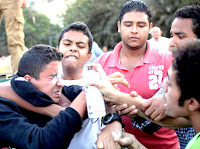ABC Australia This is a very important development - not only a royal commission on abuse - but acknowledging that resistance to investigate abuse is not only the Catholic Church but also police themselves.
EMMA ALBERICI, PRESENTER: We're joined now by Detective Chief Inspector Peter Fox, the senior police officer who took a stand on the issue and called for a royal commission here on Lateline last week.
It was on this program that Inspector Fox first made the allegations that his investigations were hindered by interference from within the police force and within the Catholic Church.
Detective Fox has driven from Newcastle tonight to be with us again, and I thank you so much chief inspector Fox for coming in again.
PETER FOX, NSW POLICE: It's a pleasure, Emma.
EMMA ALBERICI: Now of course as we just mentioned, you were the one calling for this royal commission last week. You must be feeling quite vindicated.
PETER FOX: I don't think I was the only one. I just wanted to add my voice to the many thousands out there that were already calling out for it over the last decade and more. You know, when you've sat down with these people, I just don't feel that you can turn up and walk away and think, "Well, I've got so much knowledge about what's gone on," and walk off and have an easy conscience thinking, "I could have done more, but I didn't."
I've made the comment that the turning moment for me was a forum at Newcastle where Peter Fitzsimmons, the radio DJ from down here, made the comment, "Evil flourishes when good men do nothing." And I sort of felt that perhaps he was directly talking to me. And I thought, "Well I'm not prepared to sit back and keep my mouth zipped."
EMMA ALBERICI: Now it took obviously so much courage for you to come here and talk as candidly as you did last week. What's the reaction been from within your own police ranks?
PETER FOX: Mixed, I think as most people would expect. I have been inundated with fantastic calls from ex-police and current colleagues that are thrilled to bits with this happening. I've had calls from some police that I don't know, wanting to share their frustrations and stories with me.
Conversely there's also been the uglier side of it where - I don't want to go into it too deeply, but this is the end of my policing career. I realised that from the moment that I decided to speak out last week. As much as it's denied, the culture within the police force would never allow someone like me to move back into it. So, I've ...
It was on this program that Inspector Fox first made the allegations that his investigations were hindered by interference from within the police force and within the Catholic Church.
Detective Fox has driven from Newcastle tonight to be with us again, and I thank you so much chief inspector Fox for coming in again.
PETER FOX, NSW POLICE: It's a pleasure, Emma.
EMMA ALBERICI: Now of course as we just mentioned, you were the one calling for this royal commission last week. You must be feeling quite vindicated.
PETER FOX: I don't think I was the only one. I just wanted to add my voice to the many thousands out there that were already calling out for it over the last decade and more. You know, when you've sat down with these people, I just don't feel that you can turn up and walk away and think, "Well, I've got so much knowledge about what's gone on," and walk off and have an easy conscience thinking, "I could have done more, but I didn't."
I've made the comment that the turning moment for me was a forum at Newcastle where Peter Fitzsimmons, the radio DJ from down here, made the comment, "Evil flourishes when good men do nothing." And I sort of felt that perhaps he was directly talking to me. And I thought, "Well I'm not prepared to sit back and keep my mouth zipped."
EMMA ALBERICI: Now it took obviously so much courage for you to come here and talk as candidly as you did last week. What's the reaction been from within your own police ranks?
PETER FOX: Mixed, I think as most people would expect. I have been inundated with fantastic calls from ex-police and current colleagues that are thrilled to bits with this happening. I've had calls from some police that I don't know, wanting to share their frustrations and stories with me.
Conversely there's also been the uglier side of it where - I don't want to go into it too deeply, but this is the end of my policing career. I realised that from the moment that I decided to speak out last week. As much as it's denied, the culture within the police force would never allow someone like me to move back into it. So, I've ...







